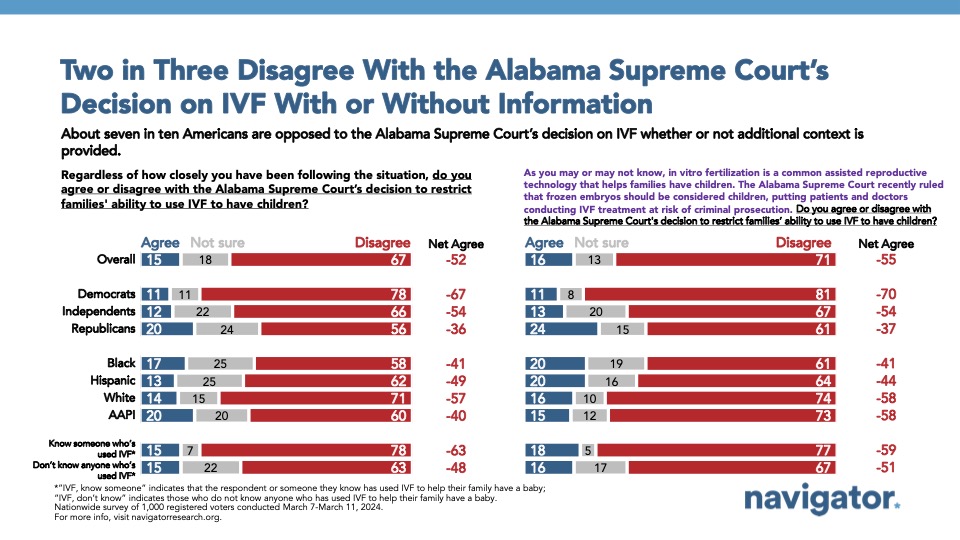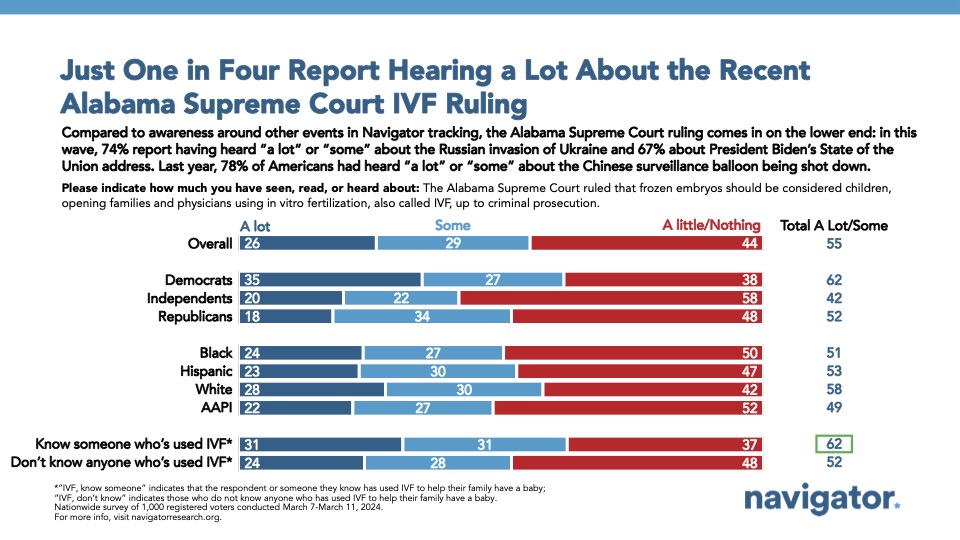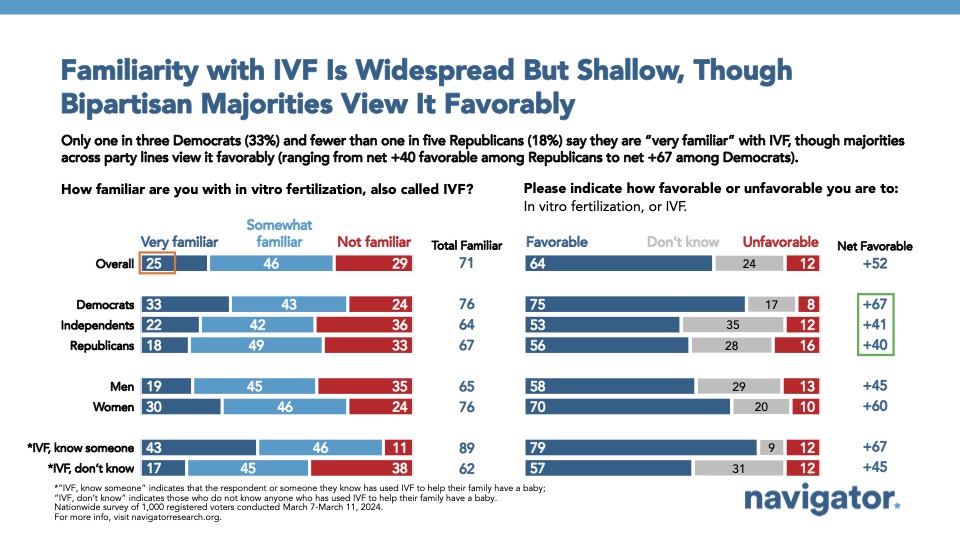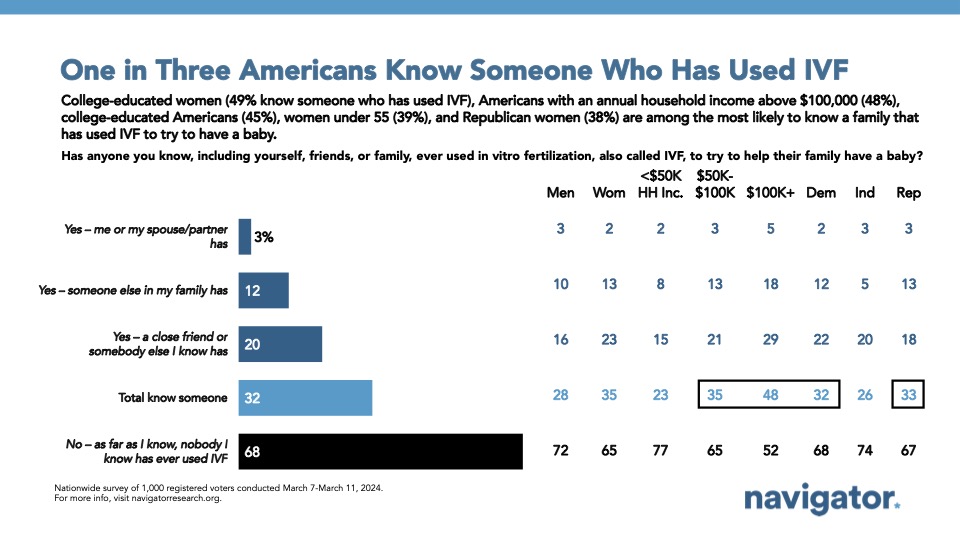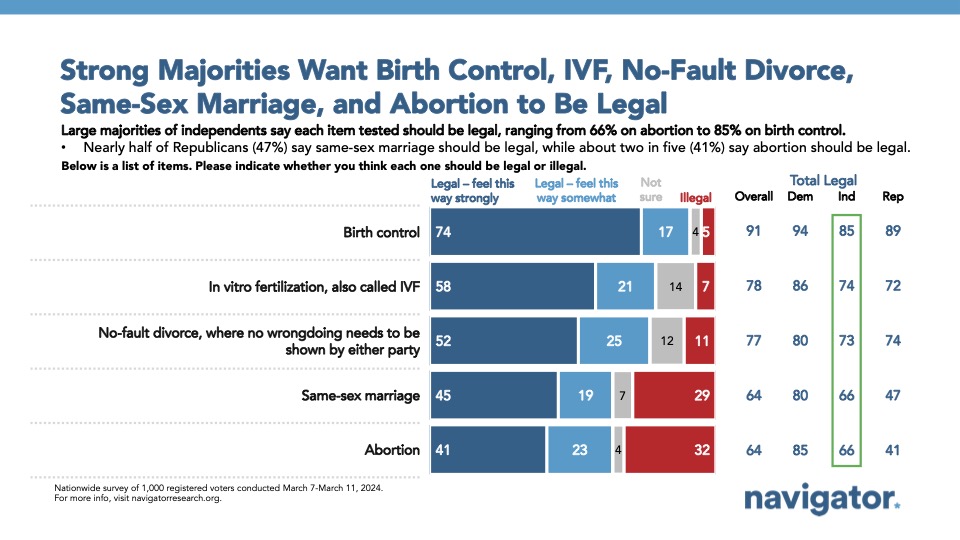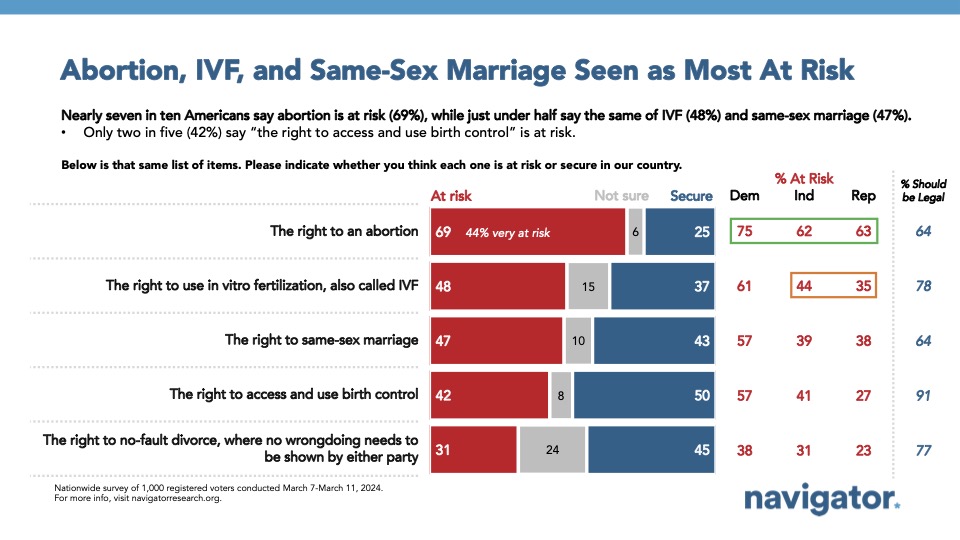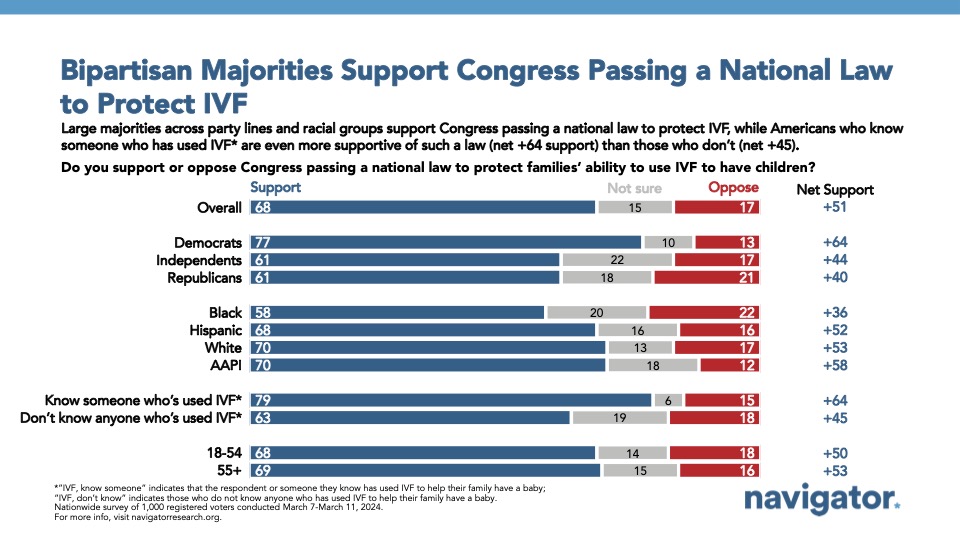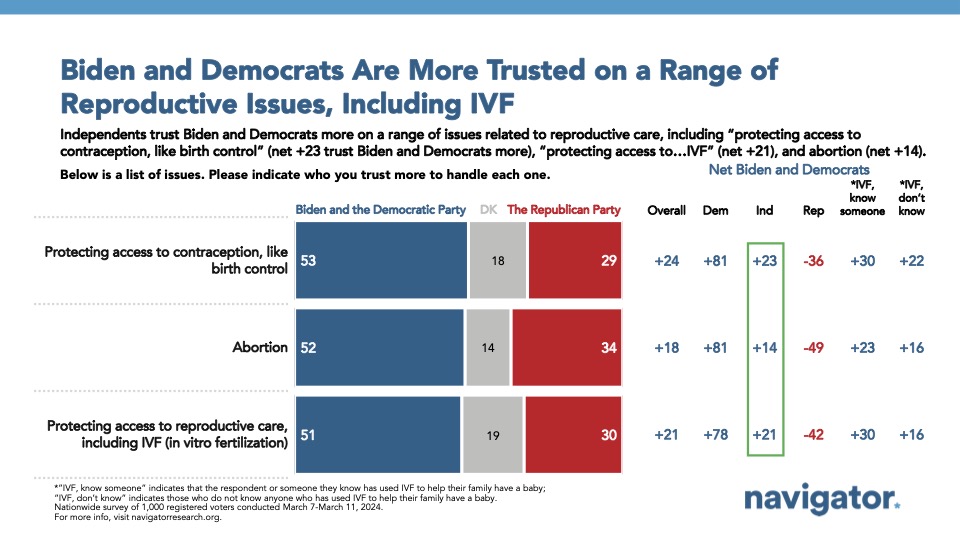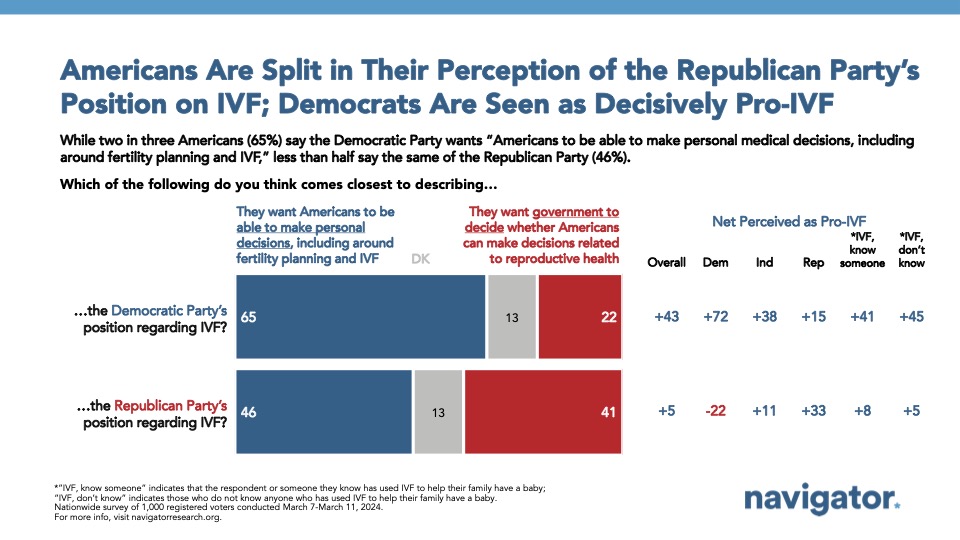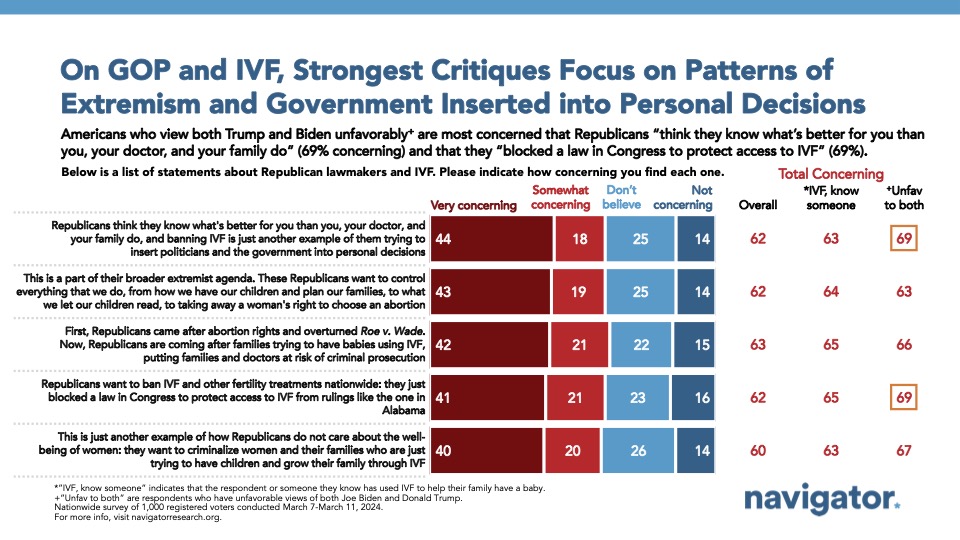Poll: IVF and Reproductive Care
This Navigator Research report contains polling data on Americans’ perception of the legality of in vitro fertilization (IVF) and the degree to which they see it under attack, as well as messaging guidance on the recent decision in Alabama that resulted in restricted access to IVF.
Two in three Americans say they disagree with the Alabama Supreme Court’s decision on IVF.
By a 52-point margin, Americans disagree with the Court’s decision to restrict families’ ability to use IVF to have children (15 percent agree – 67 percent disagree). With additional context that “in vitro fertilization is a common assisted reproductive technology that helps families have children” and that “the Alabama Supreme Court recently ruled that frozen embryos should be considered children, putting patients and doctors conducting IVF treatment at risk of criminal prosecution,” seven in ten disagree with the decision (net -55; 16 percent agree – 71 percent disagree), including four in five Democrats (net -70; 11 percent agree – 81 percent disagree), two in three independents (net -54; 13 percent agree – 67 percent disagree), and three in five Republicans (net -37; 24 percent agree – 61 percent disagree).
- Just 25 percent are “very” familiar with IVF, while seven in ten Americans are familiar with the procedure (71 percent). A third of Americans say they know someone who has used IVF to help their family have a baby (32 percent), including a third of Republicans (33 percent) and Democrats (32 percent), and one in four independents (26 percent). College-educated Americans and Americans living in households that make over $100,000 per year are most likely to know someone who has used IVF (45 percent and 48 percent, respectively).
- In vitro fertilization is viewed favorably by nearly two in three Americans (net +52; 64 percent favorable – 12 percent unfavorable), including among three in four Democrats (75 percent), and majorities of Republicans (56 percent) and independents (53 percent). 79 percent of Americans who know someone who has used IVF view it favorably, as do a majority of Americans who do not know anyone who has used IVF (57 percent).
Four in five Americans say IVF should be legal, while only a plurality see IVF as at risk.
Strong majorities of Americans believe a number of rights should be legal, including to birth control (91 percent), IVF (74 percent), abortion (64 percent), and same-sex marriage (64 percent). Access to abortion is seen as the most at risk in the country today (69 percent), though pluralities think access to IVF (48 percent) and same-sex marriage (47 percent) are at risk; birth control is seen as more secure (42 percent at risk – 50 percent secure). Americans across party lines say IVF should be legal, including 86 percent of Democrats, 74 percent of independents, and 72 percent of Republicans.
- 92 percent of Americans who know someone who has used IVF believe it should be legal, compared to 72 percent of those who do not know anyone who has used IVF. A majority of Americans who know someone who has used IVF believe it is at risk (net +20; 57 percent at risk – 37 percent secure) compared to a plurality of those who do not know anyone who has used IVF (net +8; 44 percent at risk – 36 percent secure).
- By a 51-point margin, Americans support Congress passing a national law to protect families’ ability to use IVF to have children (68 percent support – 17 percent oppose), including three in four Democrats (77 percent) and three in five independents and Republicans (61 percent each). Four in five Americans who know someone that has used IVF support a national law to protect IVF (79 percent) compared to three in five who do not know someone who has used IVF (63 percent).
Bipartisan majorities see the Democratic Party’s position as allowing families to make their own decisions on IVF, while Americans are split on where Republicans stand.
When asked which position best describes the parties regarding IVF, 65 percent say “they want Americans to be able to make personal decisions, including around fertility planning and IVF” comes closest to President Biden and the Democratic Party on the issue, including 81 percent of Democrats, 56 percent of independents, and 51 percent of Republicans. A narrow plurality believe this also describes Republicans’ position on IVF (46 percent), though 41 percent say Republicans “want government to decide whether Americans can make decisions related to reproductive health.”
- Donald Trump’s position on IVF is also less clear: 43 percent say “he wants Americans to be able to make personal decisions, including around fertility planning and IVF” while 37 percent think “he wants government to decide whether Americans can make decisions related to reproductive health.”
- A majority of Americans trust President Biden and Democrats over Republicans on a range of reproductive issues, including protecting access to contraception, like birth control (net +24; 53 percent Biden/Democrats – 29 percent Republicans), abortion (net +18; 52 percent Biden/Democrats – 34 percent Republicans), and protecting access to reproductive care, including IVF (net +21; 51 percent Biden/Democrats – 30 percent Republicans).
When talking about IVF, focusing on Republican lawmakers inserting politicians and government into personal decisions and the extremism are most concerning.
Among a list of statements about Republican lawmakers and IVF, at least three in five Americans found each concerning, including that “first, Republicans came after abortion rights and overturned Roe v. Wade… now, Republicans are coming after families trying to have babies using IVF, putting families and doctors at risk of criminal prosecution” (63 percent find this concerning, including 63 percent of independents) and that “Republicans think they know what’s better for you than you, your doctor, and your family do, and banning IVF is just another example of them trying to insert politicians and the government into personal decisions” (62 percent find this concerning, including 62 percent of independents).

